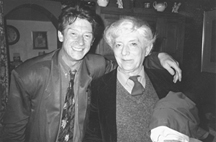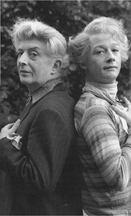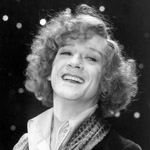I could eulogize both accurately and amusingly for many a page on the life and being of Quentin Crisp. Let me leave that to the short eulogy that I wrote for TIME magazine at the time of Quentin’s death. Bear with me then if I relate a little synchronistic tale.
In 1959, I came to London as an art student to attend the St. Martin’s School of Art, one of the schools where Quentin was a naked civil servant. St. Martin’s was a London County Council School and employees of the LCC were within the Civil Service. He was a nude model—hence, "the Naked Civil Servant."

Photographer unknown. Photo from Quentin Crisp's personal collection of images.
|
I had to find what was euphemistically termed a "bed sitting" room on the day of my arrival. I found my way to Earls Court (an area in West London) seeking out a particular news agent displaying cards of advertisement for such places in the window, most of which had, underlined in red ink, "coloureds and Irish need not apply." This I hasten to add drastically shortened the list of possibility for me. After a great deal of fruitless tramping round Earls Court, I was finally offered a squalid basement room reeking with visible damp at number 23 Westgate Terrace off The Redcliffe Square. (In the late fifties, London was still crawling away from the war and still in black and white—it was not until the early sixties that life became technicolor.) I could go on for paragraphs writing about this room—of which every inch of broken linoleum I remember to this day, but I will leave that to my autobiography as it no longer concerns this tale.
 Quentin Crisp once paid me the grand, pontifical compliment that I was "his representative here on earth." This referred to my having played him in the film of his autobiography, The Naked Civil Servant. At the time, Quentin was untraveled and 60 years old. He referred to the latter part of his expected life as "the twilight of my life." I suggested that "sunset" would be a more accurate description. He lived to be 90, and the soft light of his sunset enriched the lives of many people. Quentin Crisp once paid me the grand, pontifical compliment that I was "his representative here on earth." This referred to my having played him in the film of his autobiography, The Naked Civil Servant. At the time, Quentin was untraveled and 60 years old. He referred to the latter part of his expected life as "the twilight of my life." I suggested that "sunset" would be a more accurate description. He lived to be 90, and the soft light of his sunset enriched the lives of many people.
When I first met Quentin, he declared, "I don’t believe in abroad—I think everyone speaks English behind our backs!" After the success of Servant, Quentin was invited to New York. So from Chelsea in London he came to the Chelsea Hotel in New York—where upon entering he declared, "Home!" If Quentin ever harbored a regret in his life, it was that he had not found New York earlier.
(Originally published in TIME magazine, December 6, 1999.)
|





